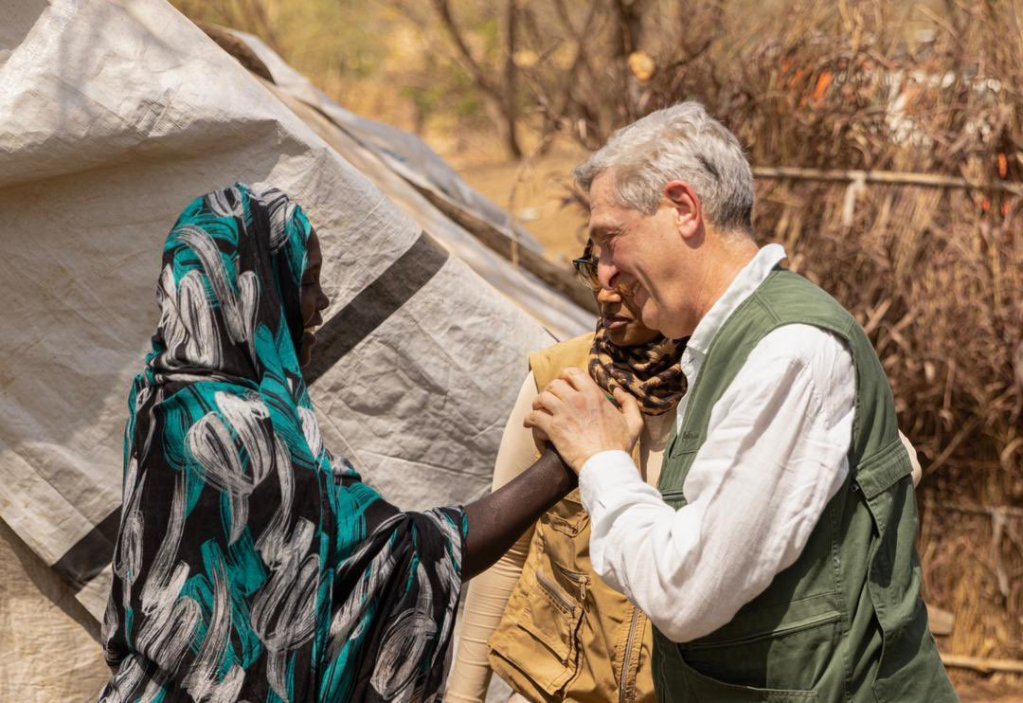The UN Refugee Agency warns that the drastic cuts in US foreign aid will endanger millions of lives and force it to "significantly reduce" its staff due to the lack of American funding. InfoMigrants interviewed Josselin Brémaud, UNHCR communications officer in France, to learn more.
The United States is UNHCR’s largest donor, contributing about 40 percent of its budget. As of September 2024, the agency had nearly 20,000 employees.
InfoMigrants: What is your reaction to the announcement of the US funding freeze?
Josselin Brémaud: We are facing an extremely serious crisis, and the funding situation of the United Nations High Commissioner for Refugees (UNHCR) is uncertain. This is linked to the decision by the United States -- our largest donor -- to review its foreign aid programs, as well as announcements by a quarter of our major donors regarding plans to reduce their overseas aid.
We are unable to confirm the amount of funding that will be available. However, we already know that in 2025 and beyond, we will have to significantly reduce our funding forecasts.
We are deeply concerned by the growing gap between needs and resources, as well as the considerable impact this will have on millions of people displaced by war and persecution.
Read AlsoUS aid cuts could lead to more refugee movements, migration to Europe
Are you already seeing the consequences of these budget cuts on the ground?
The impact of this situation on the lives of refugees is already devastating and will only worsen. These measures come on top of long-standing shortfalls in humanitarian funding.
Wars continue to force thousands of people to flee their homes to save their lives. These budget cuts mean that those in danger will not receive the assistance they need.
Refugees and forcibly displaced people need our solidarity more than ever. We are doing everything possible to ensure that lifesaving aid continues to reach the most vulnerable populations.
UNHCR has the expertise, experience, and determination to continue providing lifesaving assistance to those forced to flee. We are already mobilized on the ground, saving lives. We are effective and responsive -- and will do everything possible to limit the impact of the current situation on the lives of forcibly displaced people.
But we need donors to step up their efforts. We need more funding now -- whether private, state, or individual -- to help refugees.
Specifically, are UNHCR programs under threat?
The challenges we are experiencing have already affected our capacity to provide assistance, and further budget cuts are imminent.
These cuts have already had dramatic consequences for refugees, with the ending of crucial activities carried out by our partners in several regions.
Of the 120 million forcibly displaced and stateless people in the world, many will suffer dramatic consequences, whether in terms of access to essential medicines, emergency shelter, food, relief items, clean water, or protection services.

Vital programs will be disrupted, including assistance to religious minorities and survivors of sexual and gender-based violence and human trafficking.
Refugee registration and biometric management—essential for verifying identities, preventing fraud, and ensuring the equitable distribution of aid -- will be compromised. Millions of people will remain unregistered, hampering their access to services and weakening security and border control. Every day of delay in funding allocations will only increase these needs.
Many UN agencies, NGOs, local actors, and host countries are also facing financial uncertainty, which risks creating a domino effect, depriving displaced populations of desperately needed essential assistance and jeopardizing efforts to stabilize communities and regions.
Do you have any examples of programs compromised by these budget cuts?
Over the past month, we have observed alarming examples of the impact of this financial crisis on our operations and those of our partners, including:
- In South Sudan, only 25 percent of UNHCR's dedicated spaces for women and girls at risk are currently operational. This deprives up to 80,000 people of services such as emergency psychosocial support, legal assistance, and medical care. Programs to protect against forced marriage and other forms of violence -- particularly for adolescent refugee girls -- have also been suspended, putting more than 2,000 of them at risk.
- In Sudan, the funding cuts will deprive at least 500,000 displaced people of access to clean water, sanitation, and medical care. In a country where nine million people have been displaced by brutal conflict, the need for shelter, healthcare, and psychosocial support is immense.
- In Jordan, 63 specialized programs providing assistance to women and girls have been closed or suspended, leaving 200,000 vulnerable people, both among refugees and in host communities, without support.
